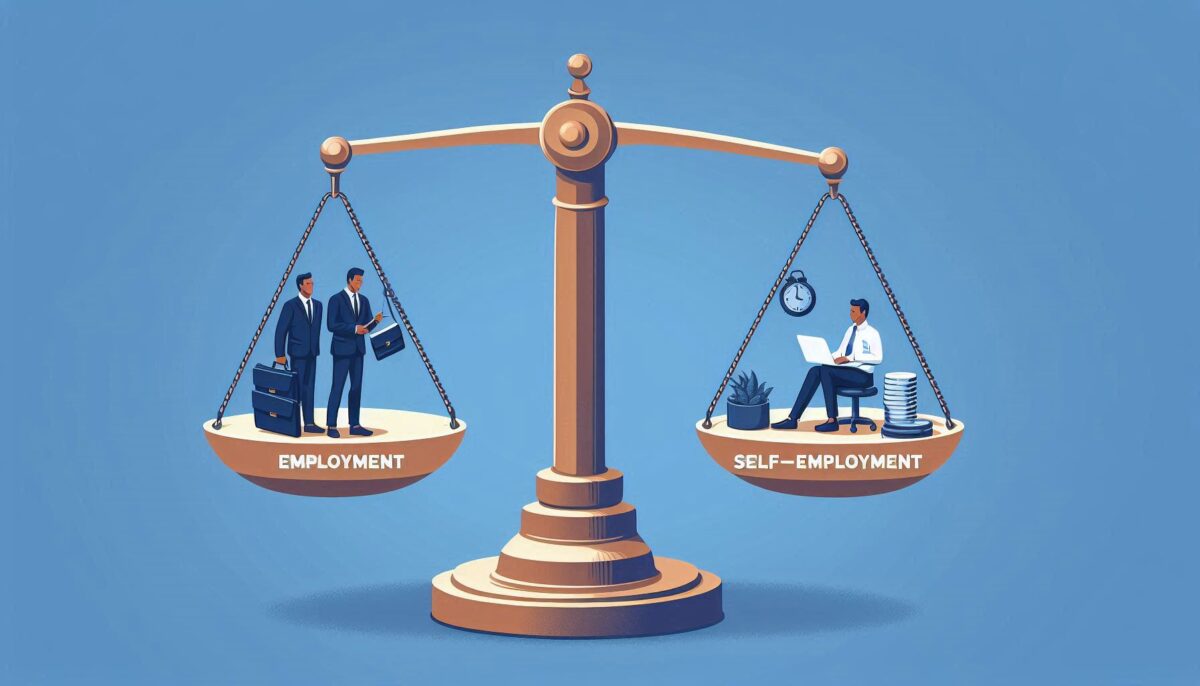Update Dec 14, 2024: Added Newsletter Email Archive at End of Post.
After having attempted to operate a few businesses over the course of my education and now post graduation, while also working some good jobs and some not so good jobs I have learned a few things that I thought might be interesting to discuss in this next blog post. What are the pros and cons to each way of doing things and what are some things that you should think about if you’re considering one or the other. Let’s start with the pros of being employed.
The Case For Staying Employed:
The nice thing about being employed, is that most of the time, someone else is telling you what needs to be done, depending on the job you can somewhat turn off your brain when it comes to deciding what to do day to day. When I’ve done self employed work, it becomes much more challenging to know what to prioritized, do you focus on marketing? Do you focus on building systems? Do you try to schmooze clients to make sure that you have clients going forward? The answer is yes, yes, and yes. You need to juggle many more priorities with self-employment that can compete for your time. When you’re employed, hopefully, you have a team to work with, while being self-employed inherently means that you are likely working solo at least in the beginning, so you don’t really have other people to lean on.
The Ugly Truth of Entrepreneurship
This goes well into my next point, when you are self-employed it can often be lonely work and this can be very demotivating, you need to build up a team of people or business associates who are doing, or trying to do a similar thing to you. No one can accomplish anything alone, so it’s important to get people on your team who you can consult with and bounce ideas off of, and often times that person will not be your group of friends who are working regular jobs and who aren’t concerned with what happens in a business. This doesn’t mean to stop hanging out with your regular friends, in fact, you’ll probably need them more than ever. It just means that you need to make sure that you are also building up a network of like minded people who can better relate to the struggles that you will inevitably go through while trying to launch a business. So lets call this a bit of a pro for being an employee, often the company is looking for a specific culture and if you fit in the culture you can make some great friends. At the very least you’ll probably be on ok terms with the people you work with and maybe even have a few people who are doing a very similar job to bounce ideas off of. Forced friends as I like to say. Obviously, if you don’t like the people you work with it can also suck just as much as having no people to work with, but at least in theory there is the option to find a new place of work that again doesn’t require you managing so many competing priorities. Regardless of whichever path you choose, I’ve learned it extremely difficult to go anywhere if you don’t build relationships or work on your ability to build relationships. In our current social media isolation era it’s easy to think all the answers are online, but the person to person component is still one of the most important factors in having both a successful business and a successful career.
Income “Potential” is Only Potential:
You will frequently see online that the way entrepreneurship or self-employment is sold nowadays is higher income potential. The important word in that phrase is “potential”. There is always potential, in whatever you do, but this seriously undersells the sacrifices that you have to make in order to reach that potential. The phrase entrepreneur comes from the phrase for someone who creates something new. So if someone is selling you on a form of self employment that is cut and paste, run away, every type of entrepreneurship is its own battle and everyone’s path is a bit different. I’m all for learning how people have come before you, but the most important thing in entrepreneurship is being a constant experimenter and being ok with constantly failing and trying something new until you find what works for you. There is so much free information, and so much information in books that you can read (for FREE, if you get it from the library) that you really should not be spending a significant amount of money when you are starting out to get your feet off the ground. The best use of money is running a short marketing experiment for the service or product you are selling for minimum a month and trying to learn from the experience and iterate.
Patience is Extremely Important
This brings my to my next point, specifically related to entrepreneurship, is that when you are trying something new, you have to accept the fact that it will take time to see the results of your experiments. You can’t expect an instant sale if you’re just running your first facebook ad, or after knocking on your first door. It’s a long, iterative, slog. A lot of entrepreneurship simply comes down to how many times you are willing to do the same thing over and over, rejection after rejection, until you finally see results. You have to be, or become someone who doesn’t give up easily.
The Rejection Goal – An Entrepreneurs Lifeline
I read a book recently, Million Dollar Weekend by Noah Kagan, in it Noah relates the story of his father who was a door to door salesperson and his frame of mind when it came to getting rejected was to set a “rejection goal” every single day. Inevitably, within that rejection goal, you may have one or two people who are actually interested in talking to you, and one or two people who are interesting in what you are selling. If you make the goal the number of times you can be rejected, rather than seeing rejection as having failed, you are much more likely to get somewhere with your business. Contrast this to a job in which your goal is to create something, or build something. The only person likely to reject you is your boss or manager. If you are somewhat more client facing then you may also have to face rejection every day, but it’s likely that your income doesn’t completely depend on this one single client. When you are self employed and looking for work, it can be easy to feel like your income does rely on one single client and this can put you in a mindset of scarcity and fear, and while a little fear might be good to help you get motivated in the morning, too much can be debilitating. So it’s important to approach a business with the mindset of working with multiple clients, and even before you start a business trying to see if there might be potential clients that would want what you are selling is a great idea to validate a business idea, even better if they give you a deposit for the thing you are selling. It’s important to not rely too heavily on one single client for all of your income for all the reasons I stated above.
Employees Can Be Self Employed Too
Another pro for being an employee is that, frequently, there is a path to becoming self-employed. If you work in an industry long enough or become respected enough in the skills that you have and the things that you do, and have people that you know would want to continue working with you specifically. Then you have the foundation of a good business, and you’d be doing what you are already doing which would reduce the overall amount of skills that you’d have to pick up that relate to entrepreneurship, and you may be able to avoid marketing altogether and simply operate off referrals. From this point of view being employed can be very beneficial, but you’d have to work in an industry where your skills are important to the job, not just being a warm body that most anyone can replicate. The more regulation, the more difficult, the more qualifications you need the better because it will make the work that you do and the skills that you have valuable. I’m going to point to something that doesn’t immediately jump to most people’s minds when they things of “business” and that is healthcare. Depending on your healthcare profession, there may be a path to either a very high income, or opening your own practice, and “professional” degree in which you can open a practice or some kind can be a good path to self-employment if you work in the industry for a while first because there will be demand for your skills.
No Matter What You Do You Can’t Do It Alone:
There is no real right or wrong way to start a business, but there is a right and wrong mindset to operate from, ultimately, you are going to be working with people, and people involve relationships, so if there’s any one skill you absolutely need or need to learn its how to be a relational person, everything other skill or talent you have is not useful if you have no one to show it or sell it to. This doesn’t mean that you can’t create a business from nothing, there are lots of software companies that pretty much exclusively exist in website or app form. But these companies are still relational companies because they are solving a problem for people, without the people there would be no company. So it’s fine to make software, to learn skills that you can sell, to do something similar to what someone has done before, but at the end of the day it will always come down to how do you reach people and get them interested enough to pay you for the thing that you are doing or the product that you are selling. I’ll leave the discussion here for now, I’m still learning and reading a lot about building businesses and becoming a better communicator and working to build better relationships. All of these little things are important in the grand scheme of life and in the grand scheme of business as well.
Keep investing,
Oliver Foote
Newsletter #18: Employment vs. Self-Employment Pros and Cons, Manhattan Real Estate, etc.

This Weeks Blog Post:
Pros and Cons of Being Employed vs. Self-Employment:
- Employment is a great way to start your own business
- There are many things about self employment that people don’t mention when they are trying to sell you on something, you need to do it for the right reasons and realize the responsibilities that come with it
- Dealing with rejection and making it a positive
Read the full blog post here: https://oliverfoote.ca/pros-and-cons-of-being-employed-vs-self-employment/
Real Estate News:
- We are officially in the summer months where the market slows down as people go on vacation, so I’m just going to say that there’s not much to report right now since the last newsletter
- The Toronto Honda Indy was in town last weekend, and as a somewhat new racing nerd I was able to stop by and see them do a couple laps last Friday after going to see a metal concert and then flying out Friday to see my family in Queens, New York and returning today (which is why this newsletter is late). On a related note, seeing their real estate prices made me grateful for Toronto prices, if you can believe it.
- Another thing I noticed being in New York, although I was mostly in pricier parts of town and airports, is that things are really expensive, even the supposedly cheap spots. Inflation in the US is definetly a real thing, as it is here. But, seeing it first hand and also thinking in currency exchanged units really drove the point home.
- I also got to see the Wall St Bull and the NYSE and all nerd out a bit about the financial district, as a bit of a finance nerd that was a must see for me. I also learned from someone who works at the 1 World Trade Center Tower that the tenants of the building after COVID reduced their footprints by around half thanks to all the work from home stuff that happened, and they have had to either sublease the rest of their space or eat the loss. But it’s interesting that even in one of the most sought after buildings in New York, the dynamics of the Pandemic are shaping the real estate market.
- I wish everyone a great summer and hope you get a chance to rest and relax a bit and explore some new places.
Market Performance as of open Tuesday July 23, 2024:
S&P 500: 5,555.74 (+17.14% YTD)
NASDAQ: 17,997.35 (+21.88% YTD)
S&P/TSX Composite: 22,813.75 (+9.30% YTD)
Canada CPI Inflation May 2024: 2.9% (0.2% Increase from Apr 2024)
Current BoC Benchmark Interest Rate: 4.75% (0.25% Decrease on June 5, 2024) Unemployment Rate June 2024: 6.4% (0.2% Increase from May 2023)
Subscribe to our newsletter!


